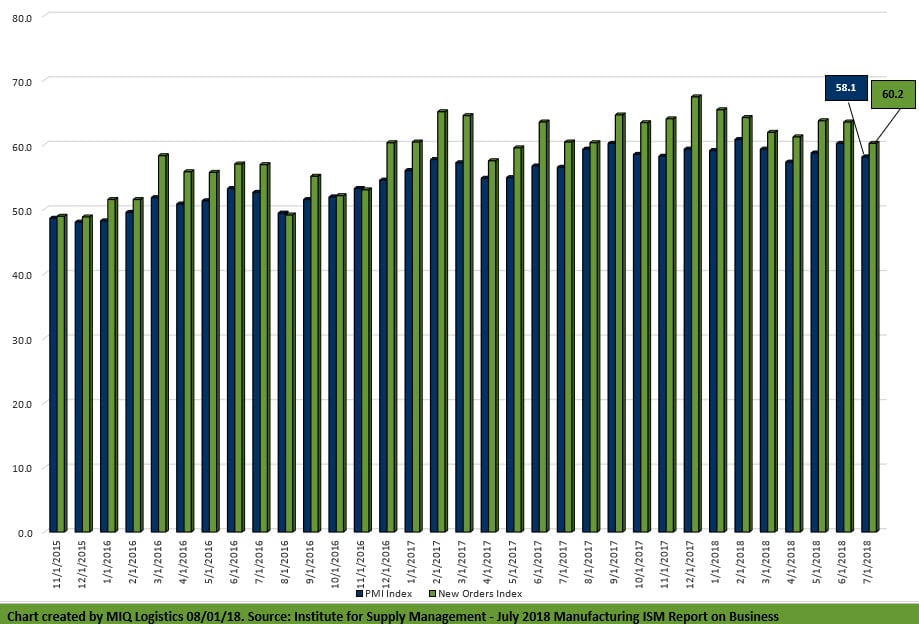Source: Institute for Supply Management
Economic activity in the manufacturing sector expanded in July, and the overall economy grew for the 111th consecutive month, say the nation’s supply executives in the latest Manufacturing ISM® Report On Business®.

The report was issued today by Timothy R. Fiore, CPSM, C.P.M., Chair of the Institute for Supply Management® (ISM®) Manufacturing Business Survey Committee: “The July PMI® registered 58.1 percent, a decrease of 2.1 percentage points from the June reading of 60.2 percent. The New Orders Index registered 60.2 percent, a decrease of 3.3 percentage points from the June reading of 63.5 percent. The Production Index registered 58.5 percent, a 3.8 percentage point decrease compared to the June reading of 62.3 percent. The Employment Index registered 56.5 percent, an increase of 0.5 percentage point from the June reading of 56 percent. The Supplier Deliveries Index registered 62.1 percent, a 6.1 percentage point decrease from the June reading of 68.2 percent. The Inventories Index registered 53.3 percent, an increase of 2.5 percentage points from the June reading of 50.8 percent. The Prices Index registered 73.2 percent in July, a 3.6 percentage point decrease from the June reading of 76.8 percent, indicating higher raw materials prices for the 29th consecutive month.
“Comments from the panel reflect continued expanding business strength. Demand remains strong, with the New Orders Index at 60 percent or above for the 15th straight month, and the Customers’ Inventories Index remaining low. The Backlog of Orders Index continued to expand, but at lower levels. Production and employment continues to expand in spite of labor and material shortages. Inputs — expressed as supplier deliveries, inventories and imports — had expansion increases, due primarily to negative supply chain issues, but at easing levels compared to the prior month. Lead-time extensions, steel and aluminum disruptions, supplier labor issues, and transportation difficulties continue. Export orders expanded, but at lower levels. Price pressure remains strong, but the index softened for the second straight month. Demand remains robust, but the nation’s employment resources and supply chains continue to struggle. Respondents are again overwhelmingly concerned about how tariff-related activity, including reciprocal tariffs, will continue to affect their business,” says Fiore.
Of the 18 manufacturing industries, 17 reported growth in July, in the following order: Textile Mills; Electrical Equipment, Appliances & Components; Apparel, Leather & Allied Products; Computer & Electronic Products; Petroleum & Coal Products; Paper Products; Printing & Related Support Activities; Nonmetallic Mineral Products; Machinery; Plastics & Rubber Products; Miscellaneous Manufacturing; Fabricated Metal Products; Food, Beverage & Tobacco Products; Furniture & Related Products; Chemical Products; Wood Products; and Transportation Equipment. The only industry reporting a decrease in July is Primary Metals.
Click here to access the entire release from the Institute for Supply Management website.
